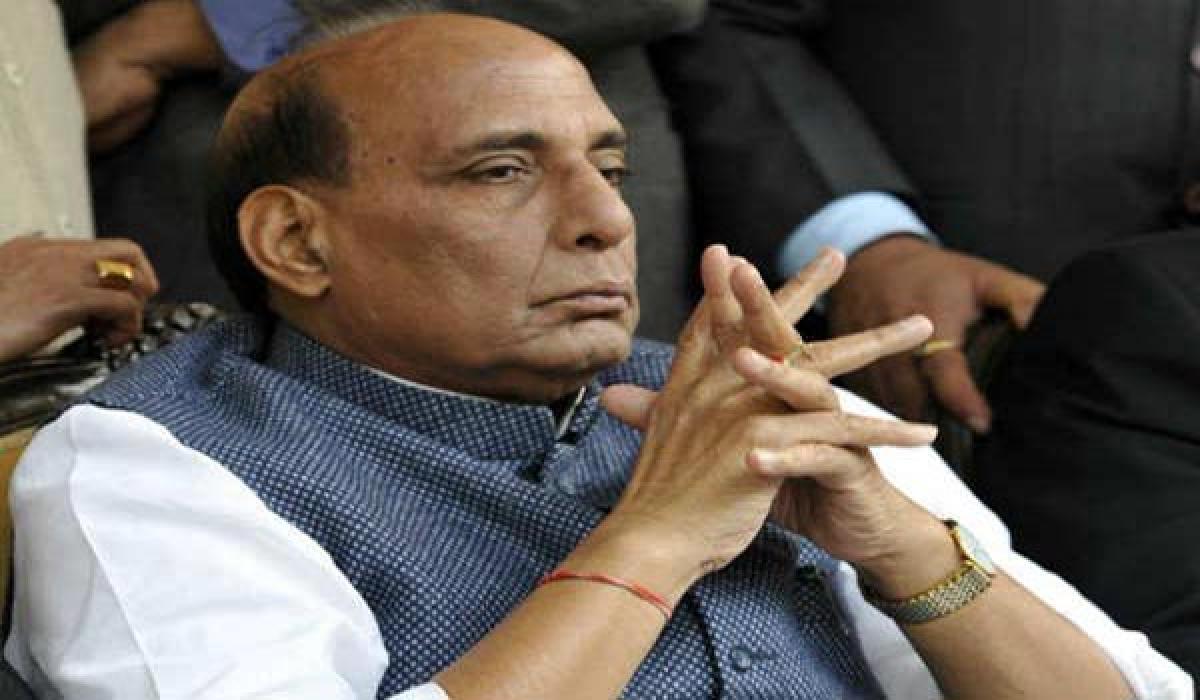Live
- Mohan Babu’s attack on journalists inhumane act
- West Quay-6 of VPA to get revamped
- Rajaiah demands govt to introduce SC categorisation Bill in Assembly
- Make all arrangements for smooth conduct of Group-2 exams
- CP congratulates chess champs
- Stage set for children’s science exhibition
- ‘Generation Green’ initiative to drive e-waste awareness
- Mysore royal family to get Rs 3,000 crore compensation for Palace Grounds
- Suspend officers who caned Panchamasali protesters: Bommai
- Unique move by student reaches over 1,500 in 8 countries
Just In

Srinagar:Union Home Minister Rajnath Singh\'s two-day Kashmir trip turned out to be a damp squib. Most people who were invited to meet him amid the current unrest - the deadliest in years - refused to see him and almost all the expectations people had from the visit seem to have sunk into despair.
Srinagar:Union Home Minister Rajnath Singh's two-day Kashmir trip turned out to be a damp squib. Most people who were invited to meet him amid the current unrest - the deadliest in years - refused to see him and almost all the expectations people had from the visit seem to have sunk into despair.
The Home Minister ended the visit on Sunday with old anti-Pakistan rhetoric that had nothing new to offer to angry Kashmiris, who are bearing the brunt of another summer of discontent following dozens of civilian killings and thousands of injuries in firing by security forces on stone-throwing protesters.
As he spoke with the media minutes before jetting back to New Delhi, Rajnath Singh did appeal for peace in the Kashmir Valley, urging youth not to throw stones and asking security forces to avoid using pellet guns that have partially or fully blinded dozens of Kashmiris including minors.
He offered medical assistance in Delhi for the injured Kashmiris.
But in the same breath, he blamed Pakistan for the trouble in the valley - ignoring the burning anger on the streets and signalling, yet again, that New Delhi looks at Kashmir and its problems through the prism of the hazardous neighbour.
The former Bharatiya Janata Party (BJP) president's comments showed no remorse or grief for the nearly 50 Kashmiri deaths in the days of violence after the July 8 killing of Hizbul Mujahideen commander Burhan Wani at the hands of security forces.
Pakistan's hand in any Kashmir trouble should not surprise India. That has been the case since the state was divided between the two countries in the 1947-48 war, more particularly after the Pakistan instigated armed insurgency broke out in the late 1980s.
Political pundits in Kashmir say Rajnath Singh could have avoided talking about Pakistan or blaming it for the Kashmir situation.
But the Home Minister could not continue with the Atal Bihari Vajpayee legacy that made him a particular favourite among Indian politicians in Kashmir when he extended "a hand of friendship" to Pakistan while on a visit to Srinagar in 2003.
"It was (New Delhi's) time-tested tactic of external scapegoating without bothering to look inwards to at least concede the wrongs within," Irshad Ahmed Shah, a professor at Kashmir University, told IANS.
"Rajnath showed the central government's lack of political foresight about Kashmir. He and other politicians in Delhi had been blaming Pakistan and they can continue doing so. But Srinagar was not the proper place and the timing was also not right."
Shah said a mere political posture expressing sympathies with Kashmiris and recognizing their anger would have helped a lot defuse the street anger.
Burhan Wani's killing was only a trigger, he said.
The fury in Kashmir had been building up over lots of issues, including alleged government provocative proposals for the appropriation of land for separate colonies for retired soldiers, exiled Kashmiri Pandits and permanently rehabilitating west Pakistani Hindu refugees in the state.
"Why don't you look at your own provocations first? Did Pakistan provoke police to behave in a particular manner? How are you blaming Pakistan for what your police and paramilitary forces did that set in motion the present cycle of violence and counter-violence," asked Ishfaq Qadri, a university scholar studying Kashmir's oral history narrative.
Rajnath Singh had wished to meet cross sections of the people, including trade union leaders, employee associations, religious leaders and journalists. Traders, employees and journalists squarely declined. There are allegations that Imams were bused from Jammu. Maybe false, but those who met him were unknown faces.
"I am sure the Home Minister must have gauged the public mood in the shape of the boycott by all trade bodies," ruling Peoples Democratic Party (PDP) MP Tariq Karra said in a statement.
On the streets of Srinagar, a verbal joke has been making rounds - it could have made to SMS or WhatsApp but most of the cellular services are barred in Kashmir - that the Home Minister could not even restore your cell phones and you are hoping for "Azadi from India".

© 2024 Hyderabad Media House Limited/The Hans India. All rights reserved. Powered by hocalwire.com







